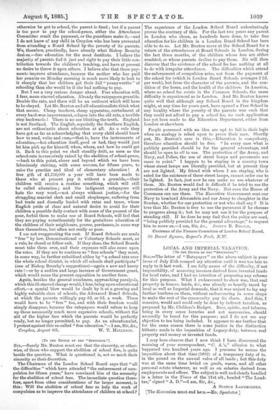LTO THE EDITOR OF THE " SPECTATOR:1
Sia,—Surely Mr. Buxton must see that the sincerity, or other- wise, of those who support the abolition of school fees, is quite beside the question. What is questioned is, not so much their sincerity as their discretion..
The Chairman of the London School Board says that "all the difficulties" which have attended "the enforcement of com- pulsion for fifteen years," have convinced him of the necessity for the abolition of school fees. The immediate question there- fore, apart from other considerations of far larger moment, is this : Will the abolition of school fees so help the work of compulsion as to improve the attendance of children at school? The experience of the London School Board unhesitatingly proves the contrary of this. For the last two years any parent in London who chose, as hundreds have done, to take free education for his children in a London Board School has been able to do so. Let Mr. Buxton move at the School Board for a return of the attendances at Board Schools in London, during the last three months, of the children whose fees are either remitted, or whose parents decline to pay them. He will then discover that the existence of the school fee has nothing at all to do with irregular attendance. The difficulties which attend the enforcement of compulsion arise, not from the payment of the school fee (which in London Board Schools averages 2 2d. per week), but from the character of the parents, and the con- dition of the home, and the health of the children. In America, where no school fee exists in the Common Schools, the same difficulty is experienced as in London. And Mr. Buxton knows quite well that although any School Board in the kingdom might, at any time for years past, have opened a Free School in any locality where the poverty of the parents was such that they could not afford to pay a school fee, no such application has yet been made to the Education Department, either from London or elsewhere.
People possessed with an idea are apt to fail in their logic when an analogy is relied upon to prove their case. Shortly put, Mr. Buxton's case is this,—Education is compulsory, therefore education should be free. "In every case what is publicly provided should be for the general advantage, and should be open to all to use. The protection of the Army, and Navy, and Police, the use of street lamps and pavements are cases in point." I happen to be staying in a country town where street lamps are liberally provided, but at present they are not lighted. My friend with whom I am staying, who is rated for the existence of these street lamps, cannot order one to be lighted. In fact, just now he can make no use whatever of them. Mr. Buxton would find it difficult if he tried to use the protection of the Army and the Navy. Not even the House of Commons can use them. The Executive Government sent our Navy to bombard Alexandria and our Army to slaughter in the Soudan, whether for our protection or not who shall say P It is true that Mr. Buxton is free to use the pavement if he chooses to progress along it ; but he may not use it for the purpose of standing still. If he does he may find that the police are used, " being publicly provided for the general advantage," to request him to move on.—I am, Sir, &c., JOSEPH R. DIGGLE, Chairman of the Finance Committee of London School Board. 36 Dorset Square, Regent's Park, N. TV.


































 Previous page
Previous page